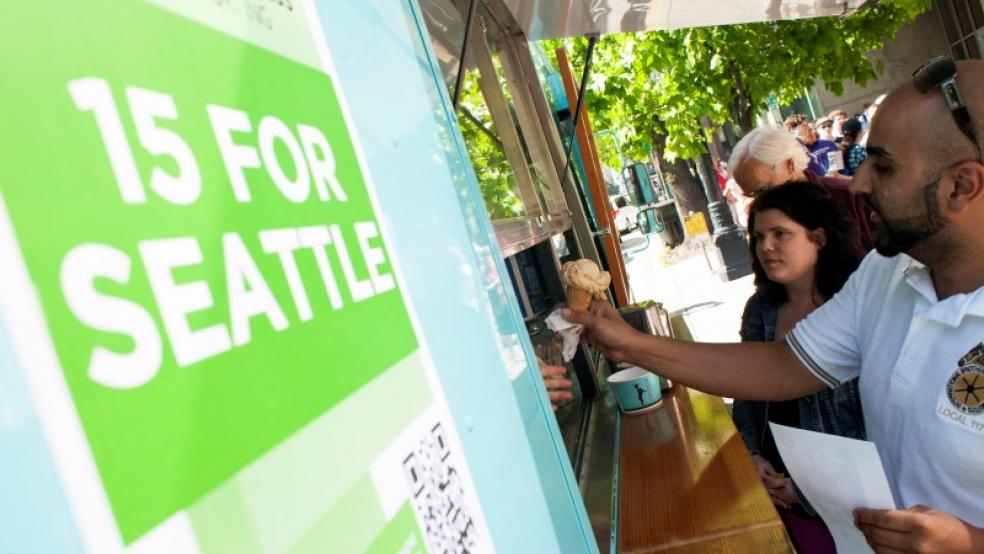A grand experiment is underway in some of America’s largest cities, where the minimum wage has been increased, with the goal of gradually reaching $15 an hour. Supporters of these increases say they will finally provide a decent wage for workers who have been left behind for years. Opponents argue that the changes will squeeze businesses, raise consumer prices, and ultimately backfire on workers.
A new University of Washington study on the first nine months of Seattle’s minimum wage ramp-up isn’t likely to make either camp happy. The findings suggest that the minimum wage increases enacted thus far have had little impact on either workers or businesses, in large part because the local economy has strengthened.
Related: Economics Isn’t Textbook: Why We Need to Raise the Minimum Wage
Two years ago, Seattle passed a law to raise its minimum wage to $15 an hour using a phased-in approach, with the minimum wage climbing each year and reaching $15 an hour in three to seven years, depending on the size of the business involved and whether they offer employees health insurance benefits. The first step in this ramp-up kicked in on April 1, 2015 and brought the minimum wage up to $10 or $11 an hour. Washington State had already had the country’s highest state-level minimum wage, at $9.32 an hour.
The researchers found that, under the first phase of the new law, the typical “low wage worker” in Seattle saw their salary increase from $9.96 per hour to $11.14 per hour by the end of 2015. The catch, they say, is that while some of this increase is due to the minimum wage increase, most is due to the strength of the region’s economy, which benefitted from expansion in the tech sector (Amazon and Microsoft are located there), a construction boom and a job growth rate three times the national average from mid-2014 to late 2015.
Overall, the study noted that Seattle’s low-wage workers took home $13 more per week as a result of the minimum wage increases, but they benefitted less than a control group of workers in surrounding zip codes that didn't have a minimum wage hike. The wage increase is also attributable to reduced employment rates among low-wage workers, suggesting some additional belt-tightening among employers in response to the hike, or replacement of personnel by technology. (Update: Some critics say that the "synthetic control" model used in the study is problematic and, as a result, they challenge the value of the findings.)
Related: JPMorgan to Raise Minimum Wage for 18,000 US Workers
“Increased wages were offset by modest reductions in employment and hours, thereby limiting the extent to which higher wages directly translated into higher average earnings,” the researchers noted. (Update: The number of hours worked actually rose, but less than in the comparison region being used.)
As for the impact on employers, the study found that the minimum wage increase led to a modest 0.7 percent increase in business closures, which was more than offset by increases in business openings due to the strengthened economy. “A higher minimum wage changes the type of business that can succeed profitably in Seattle, and we should thus expect some extra churning,” they wrote. The study says its findings are consistent with other research that suggests labor-intensive industries could see more closures and capital-intensive businesses should see more openings.
The researchers also warn that what happens in Seattle as the city’s minimum wage eventually climbs to $15.75 an hour may not tell us much about how other regions would be affected by a similar hike. “Seattle’s strong economy may make it capable of absorbing higher wages for low-wage workers,” they wrote, “and this capacity may not be present in other regions.”
So we’ll have to keep watching to see how the grand experiment unfolds in Seattle and in every other location where the minimum wage has been raised.
This article was updated at 6:30 p.m. on Thursday, July 28.




